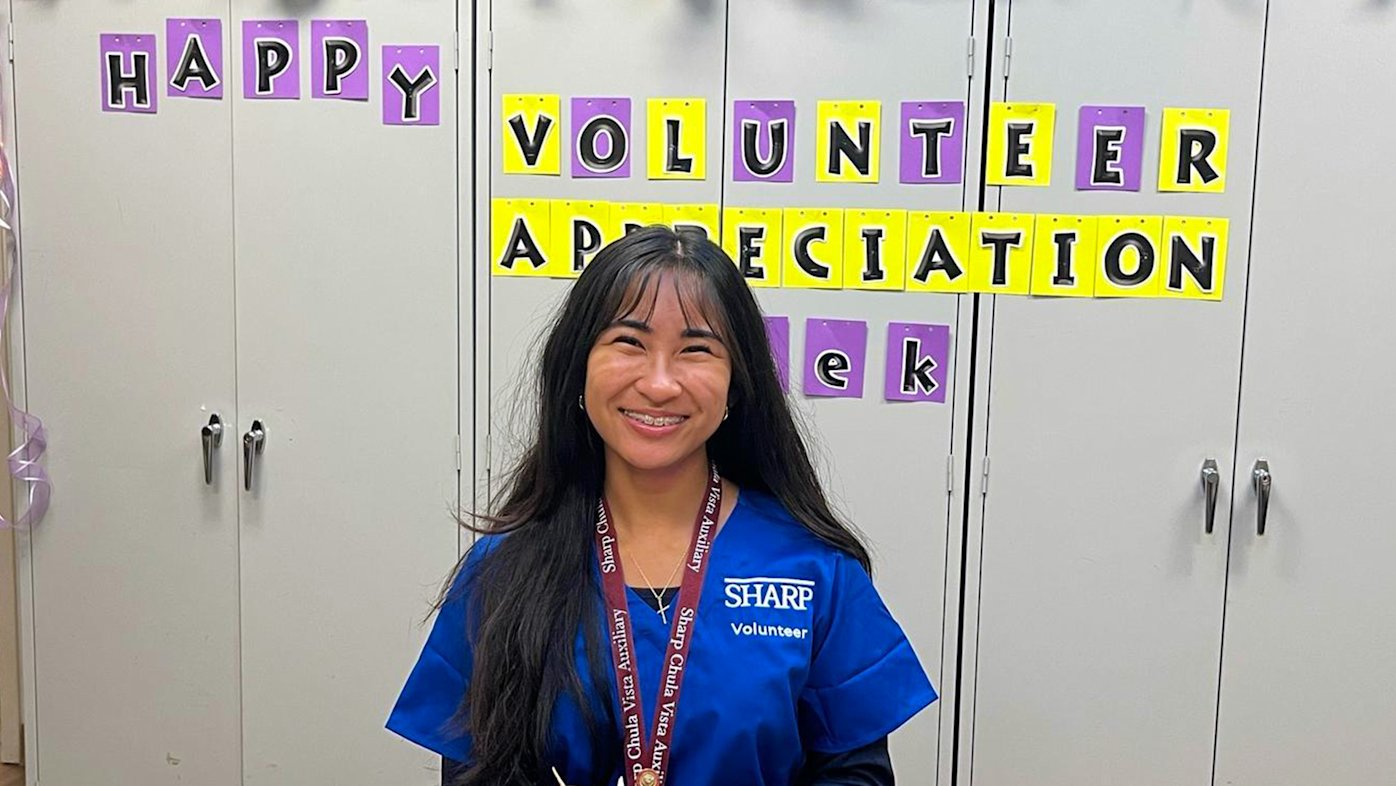
Student volunteer brings joy with wishing cranes
Carefully folded origami cranes carry messages of hope and healing, as one teen volunteer helps brighten patients’ days at Sharp Chula Vista Medical Center.
A little bit of laughter can go a long way, especially at a hospital. As a volunteer clown at Sharp Grossmont Hospital, Dr. William Pogue experienced this firsthand.
For more than 30 years, Dr. Pogue worked as a radiologist at the hospital. Many years after retirement, he could still be found roaming the halls with his certified pet therapy dogs, bringing smiles and cheer to patients and staff. While many know him best by his clown alter ego, “Pokonose,” they might be surprised to learn about his past at Sharp Grossmont and the path that led him there.
The Path to Grossmont Hospital
As an undergrad at Williams College in Massachusetts, Dr. Pogue thoroughly enjoyed his biology and biochemistry courses. He was fascinated by the millions of chemical reactions constantly happening in the human body to sustain life, which led him to take up medicine.
After studying at the George Washington University School of Medicine in Washington, D.C., Dr. Pogue completed an internship and four-year residency at UCLA. From there, he went on to work at Huntington Memorial Hospital in Pasadena.
He began his medical career in the mid-1960s during the days of the draft, when the U.S. military needed doctors. At age 31, Dr. Pogue was drafted as a doctor and spent two years at Balboa Medical Center during the height of the Vietnam War. There, he served as the chief medical resident, responsible for training the other residents.
In 1967, Dr. Pogue joined the medical staff at Grossmont Hospital. He and other doctors were instrumental in obtaining the region’s first CT scanner in 1975. At the time, it was the only CT scanner south of Los Angeles and west of Phoenix. Throughout his career, he helped many patients and witnessed the hospital expand and become more advanced.
Retirement doesn’t have to be boring
In 2000, Dr. Pogue decided it was time to retire. Having read that many people — particularly in his profession — become bored and depressed after retirement, he decided on a few ways to occupy himself: he bought a motorcycle, signed up for piano lessons and started clowning. The latter came to be after Dr. Pogue learned that a social worker at Sharp Grossmont wanted to begin a clowning program. When the hospital offered a course in clowning, he seized the opportunity, and so began Dr. Pogue’s volunteer service.
“Caring clowns are much different from performing clowns,” explains Dr. Pogue. “The focus is not on performing; our job is to visit patients and cheer them up, or lend a listening ear when they need someone to talk to. Visiting and interacting with patients on a personal level helps keep their mind off their medical issues, at least temporarily.”
It can be extremely difficult when someone is dealing with a medical issue that keeps them in the hospital, sometimes with no distractions or loved ones to visit. A hospital stay can take a toll on their spirit and bring down their mood, which can negatively affect the healing process.
“With some patients, there is a noticeable change in demeanor between the time that we enter the room and when we leave,” he says. “Many are in a much better mood, and the positivity they feel after our interactions sticks with the patient after we leave. That boost gives them a better outlook, gets them more engaged in their care and carries over into their recovery.”
Doctors and nurses need cheering up, too
In a busy, demanding profession where burnout is common, Dr. Pogue understands that nurses, doctors and other employees need a smile and a laugh just as much as patients. So he made it a point to cheer them up too. Connecting with staff helps boost their mood, which can improve their interactions and relations with patients.
“In addition to the more than 1,620 hours of service Dr. Pogue provided with his certified pet therapy dogs, Thunder and Rayo, he also mentored and trained new therapy clowns,” says Linda Van Fulpen, manager of volunteer services at Sharp Grossmont Hospital. “He was a tireless advocate for humor in health care and enjoyed sharing his talent, rubber chicken, corny jokes, colorful outfits and ‘I Met a Clown Today’ stickers with our patients, staff and physicians.”
Although Dr. Pogue has retired from clowning, his legacy lives on in the memories and minds of many, including his old clown crew who continue to carry on the tradition.

The Sharp Health News Team are content authors who write and produce stories about Sharp HealthCare and its hospitals, clinics, medical groups and health plan.

Dr. William Pogue is a retired radiologist who was affiliated with Sharp Grossmont Hospital. He now volunteers there.
Our weekly email brings you the latest health tips, recipes and stories.